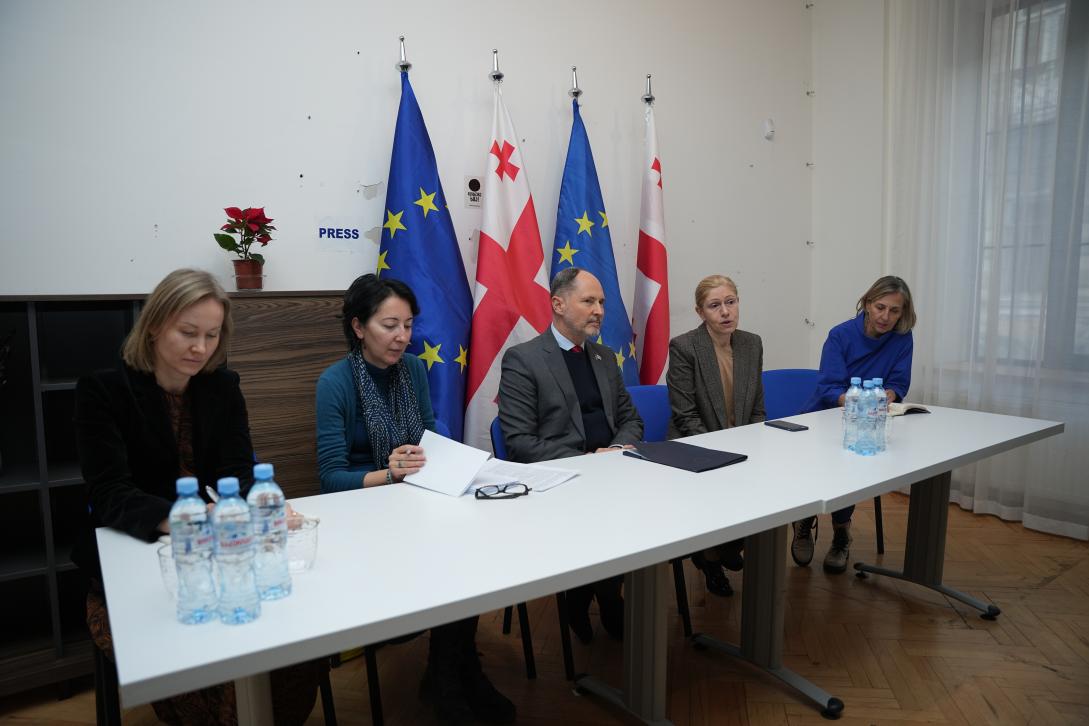Speech by the EU Ambassador Pawel Herczynski at the meeting with the media organised by the Charter of Journalistic Ethics

Dear friends,
I am very grateful for this opportunity to meet with you in these challenging times. In recent weeks, we all witnessed violent, disgusting attacks against you and your colleagues. I sincerely hope that those who were injured, your colleagues, are recovering fast and that such deplorable attacks will not happen again. Those who committed these horrible crimes must be brought to justice as quickly as possible.
I have always tried to be accessible and answer every question from journalists. But today, I am here to express solidarity in the face of the appalling treatment you, as journalists and managers of media outlets, have been receiving in the past weeks.
I never imagined we would be witnessing such brutal treatment of the media on the 1st anniversary of granting candidate status to Georgia (on 14th December 2023).
I am grateful to the Charter of Ethics for hosting this meeting. When the EU (together with the Council of Europe) founded the Charter of Ethics in 2009, its aim was to promote European standards, quality, professionalism and ethics in Georgian journalism. Based on the Charter’s principles, we established the EU Journalism Prize (13 years ago) to encourage standards further and promote quality and professionalism in the media.
For many years, we believed that the priority need was to assist in developing media standards. Unfortunately, we see today that such priorities have changed drastically. The priority is now to physically protect journalists from beating, physical and verbal aggression, intimidation, persecution, ill-treatment and even torture – this is the alarming allegation which featured in the Public Defender’s statements. It cannot be taken lightly.
The EU funds media development projects and many of you may be their beneficiaries. Prompted by the treatment of the media by the authorities, some projects had to adapt their activities to provide trainings for physical and psychological protection . Against these inexcusable developments, I commend the resilience and courage that you have shown as citizens and journalists. Do not underestimate the power of your work. As foreign diplomats, we strongly value and rely on your work which contributes to our ability to decrypt complex developments. You also make our voice heard when it is most needed.
In every Statement and at every level the EU has consistently condemned actions aimed at silencing the media and preventing it from carrying out its professional duties. You must have heard the statement from HR/VP Kallas day before yesterday that: ‘Democracies do not oppress opposition voices or curtail the freedom of media.’ That is why, irrespective of developments, our steadfast support to free and independent media in Georgia will remain a priority. You will also have seen that the EU will halt funding that benefits the Georgian authorities. But we will continue, and even increase, our support to civil society and independent media.
During last year’s Journalism Prize ceremony, I made a plea to the media to communicate more and better about the enlargement process and what it means for Georgia. Today, Georgia’s EU accession is stopped and EU-Georgia relations are at the lowest point ever because of a series of undemocratic decisions taken by the Georgian parliament and government. It is important that you continue to do your job and report on this.
I do not wish to end on this negative sentiment and want to express hope that Georgia will return to the democratic trajectory and the EU accession will be resumed.
I know that each of you is committed to this trajectory; you have proven this through your selflessness and dedication to your journalistic profession. Thank you all for this.
